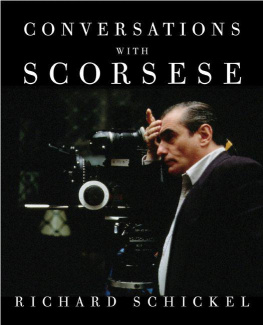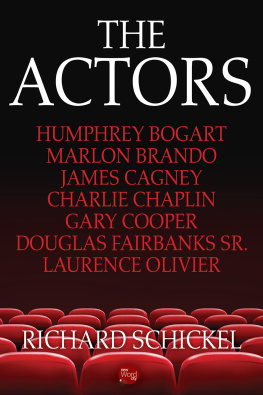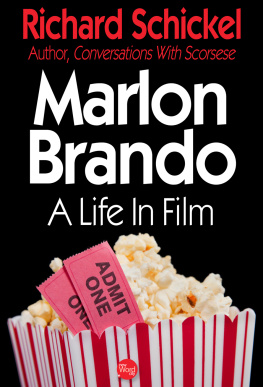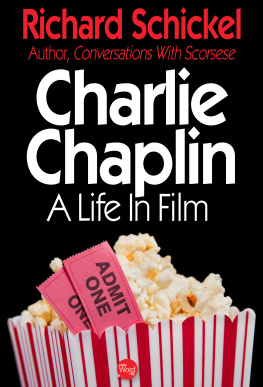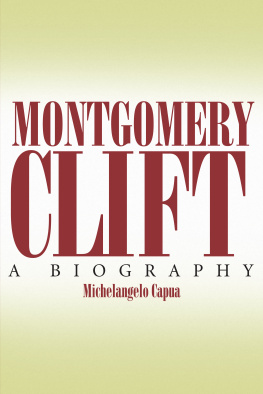Richard Schickel - Elia Kazan: A Biography
Here you can read online Richard Schickel - Elia Kazan: A Biography full text of the book (entire story) in english for free. Download pdf and epub, get meaning, cover and reviews about this ebook. year: 2006, publisher: Harper Collins, genre: Detective and thriller. Description of the work, (preface) as well as reviews are available. Best literature library LitArk.com created for fans of good reading and offers a wide selection of genres:
Romance novel
Science fiction
Adventure
Detective
Science
History
Home and family
Prose
Art
Politics
Computer
Non-fiction
Religion
Business
Children
Humor
Choose a favorite category and find really read worthwhile books. Enjoy immersion in the world of imagination, feel the emotions of the characters or learn something new for yourself, make an fascinating discovery.

- Book:Elia Kazan: A Biography
- Author:
- Publisher:Harper Collins
- Genre:
- Year:2006
- Rating:5 / 5
- Favourites:Add to favourites
- Your mark:
- 100
- 1
- 2
- 3
- 4
- 5
Elia Kazan: A Biography: summary, description and annotation
We offer to read an annotation, description, summary or preface (depends on what the author of the book "Elia Kazan: A Biography" wrote himself). If you haven't found the necessary information about the book — write in the comments, we will try to find it.
Elia Kazan: A Biography — read online for free the complete book (whole text) full work
Below is the text of the book, divided by pages. System saving the place of the last page read, allows you to conveniently read the book "Elia Kazan: A Biography" online for free, without having to search again every time where you left off. Put a bookmark, and you can go to the page where you finished reading at any time.
Font size:
Interval:
Bookmark:
A BIOGRAPHY
Elia Kazan
RICHARD SCHICKEL

For Thomas Berger
and Robert Kotlowitz
and in memory of David T. Bazelon
Friends, Mentors, Exemplars
On the evening of January 7, 1999, most of the thirty-nine-member Board of Governors of the Academy of Motion Picture Arts and Sciences assembled at the academys headquarters on Wilshire Boulevard in Beverly Hills. Their task was to choose the recipients for the various honorary awards to be bestowed at its annual Oscar ceremonies, scheduled that year for Sunday, March 21.
In recent years honorary Oscars had tended to go to distinguished foreign filmmakersAkira Kurosawa, Federico Fellini, Satyajit Ray, Michelangelo Antonioniauteurs not only of great bodies of work, but authors, as well, of the surge of American interest in foreign films that began in the 1950s. It was hard to think of an internationally celebrated director the academy had, by now, failed to honor. The same could be said for older American directors and stars, products and creators of the so-called Classic Age of the American cinema (the 1930s and 40s).
Karl Malden, however, thought there was one notable omission among the Americans. That was the friend of his youth, as well as the director of some of his own best performances: Elia Kazan, then eighty-nine years old. Malden, who was himself eighty-five at the time, was an academy elder statesman. Winner of the 1951 supporting actor Oscar (for his performance in Kazans A Streetcar Named Desire), he was also one of its former presidentsstill an active, respected figure on its governing board, not given to radical statements or quixotic gestures.
He expected to encounter difficulties making his case for Kazan. For one thing, the honorary Oscar had also become something of a consolation prize for American moviemakers, awarded to people like Cary Grant, Alfred Hitchcock and Howard Hawks, who, despite great bodies of work, had somehow not won the prize for a specific film. Kazan, however, had two such Oscarsfor directing Gentlemans Agreement (1947) and On the Waterfront (1954)and that might weigh against him.
Infinitely more important was the fact that in 1952 Kazan had named names to the notorious House Committee on Un-American Activities (hereinafter referred to by the common, if slightly inaccurate, acronym HUAC) during the course of its intermittent investigations (between 1947 and 1958) of alleged Communist infiltration in the entertainment industry. Kazan had not been alone in naming past party associates; close to one-third of the show folks called before the committee had done the same. Nor had he been a particularly voluble witness. He had joined the fractious, influential Group Theatre in 1932 and in 1935 joined The Groups Communist unit, which he left (in considerable disgust) some nineteen months later. In his account, the party had ordered its members to take over The Group Theatre, setting a new, more narrowly leftist political agenda for it. This Kazan, fiercely loyal to an institution that had offered him his first artistic home, refused to do.
When he testified before HUAC, he named eight Group Theatre members who were also Communists, one of whom was dead, and two of whom had long since left the party. He also named two open members of the party; a non-Group actor, also deceased, a stagestruck Group hanger-on, and four individuals who had been noncreative members of another organization, the League of Workers Theatre, where Kazan had taught and directed.
The transcript of his testimony shows him refusing to speculate about the political beliefs of other leftists he had known in those years. He spoke only of what he knew from direct personal experience. He could not, and did not, speak of their present political beliefs. It appears to me certain that the names of all members of the Groups Communist unit were known to the committee, though it may be that Kazan was the first to openly identify one or two of them. Only one of them, however, a man who had become a television executive, was interesting enough for the committee to subpoena. Another man, still an actor, was immediately blacklisted and prevented from pursuing his modest career as a movie character player.
The largest harm Kazan did was to himself. More than any of the other friendly HUAC witnesses, he became a symbol of collaboration with the enemies of, as it were, liberal belief. In part that was because he truculently defended his actions in a paid advertisement in the New York Times, outraging what remained of the Communist left and its allies. Though he later demonstrated considerable remorse over his actions, he had never seemed sufficiently contrite to his enemies. You had to ferret his regrets out of a book-length interview he had granted the French critic Michel Ciment in 1974 and out of his 1988 autobiography.
A large part of the condemnation of Kazan derived from the widely held belief that he had been in the most secure position to defy the committee. In the forties and fifties he was unquestionably the most important director in the American theater as well as the most significant of the younger movie directors. It was thoughtand people have continued to believethat Kazan might have gone on working un-trammeled in the theater (where the blacklist had less influence) while awaiting its inevitable demise in the movies. So his choice became an ineradicable black mark against him, even though others who testified as he did were, if not entirely forgiven, then reaccepted, without undue rancor, within the show business community.
Kazan, too, went on working. He was too gifted not to, and, besides, in the 1950s, with the cold war at its height, there were many who accepted his testimony as an intelligible and realistic action. It was only later, beginning in the 1960s, with its vast sea change in American political attitudeswhich included ending the Hollywood blacklistthat his testimony began to be more generally abhorred.
There is no doubt that his political position cost him some honors that normally accrue to men and women of his accomplishment in their later years. He had, to be sure, received, without incident, one of the Kennedy Center Honors in 1983. But as early as 1989 Malden had proposed him for the American Film Institutes Life Achievement Award, which was refused him after an acrimonious boardroom debate, some details of which eventually leaked to the press. Other awards from the San Francisco Film Festival and the Los Angeles Film Critics had also been hotly discussed and denied.
So Maldens guess that he had his work cut out for him when he entered the academys boardroom was not unreasonable. In his presentation Malden admitted what everyone knew, that he was asking them to honor a frienda dear friend, who, he observed, had been more frequently honored abroad than in the United States. He also stressed how many people he had made stars of, from nothing. How many people he had found. To that thought he added another: Ive sat on this board for over nine years and I cant tell you how many times we have heard, we are not interested, we have nothing to do with politics, only with art. And thats why Im telling you, if youre picking on art, you couldnt have picked a better person. He told me later, I think thats what sold it.
Something surely did. By all accounts, his proposal encountered no opposition, even though the governors included many individuals who continued to deplore Kazans testimony. The motion to award an honorary Academy Award to Elia Kazan was seconded by several board members and passed unanimously.
Font size:
Interval:
Bookmark:
Similar books «Elia Kazan: A Biography»
Look at similar books to Elia Kazan: A Biography. We have selected literature similar in name and meaning in the hope of providing readers with more options to find new, interesting, not yet read works.
Discussion, reviews of the book Elia Kazan: A Biography and just readers' own opinions. Leave your comments, write what you think about the work, its meaning or the main characters. Specify what exactly you liked and what you didn't like, and why you think so.

